| Srl | Item |
| 1 |
ID:
164562
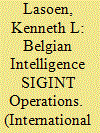

|
|
|
| 2 |
ID:
153166
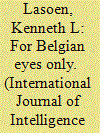

|
|
|
|
|
| Summary/Abstract |
The Kingdom of Belgium has two intelligence services. The domestic State Security service, the Veiligheid van de Staat–Sûreté de l’Etat (VSSE), was established in 1830. A military intelligence service, the Algemene Dienst Inlichtingen en Veiligheid–Service Général du Renseignement et de la Securité (ADIV/SGRS–ACOS-IS1 Within the Belgian Defence flow chart, the service is known as ACOS-IS, Assistant Chief of Staff Intelligence and Security.
), was established in 1915 to provide intelligence for the military and act as a security service for the Belgian Army’s operations.
|
|
|
|
|
|
|
|
|
|
|
|
|
|
|
|
| 3 |
ID:
156670
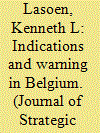

|
|
|
|
|
| Summary/Abstract |
The terrorist attacks in France and Belgium of 2015–2016 that occurred while these countries were in a heightened state of alert raise questions about indications and warning methodology as well as effectiveness of the blanket-protection deployment of security services assisted even by the military. Response and perhaps even more anticipation may require strategic rethinking in light of the predatory attacks that target the most vulnerable spots of the public space. This study looks at threat analysis in Belgium as conducted through her intelligence fusion centre Coordination Unit for Threat Analysis (CUTA) since its inception in 2006. With a special focus on what is known, at the time of writing, about the terrorist attacks in Paris and Brussels, this study hopes to put into context how the system (mal)functions and will also consider the preventive measures that respond to the threat, and the international aspects which have implications far beyond Belgian borders. Therefore, a case is made for not just a Belgian homeland security framework, but one that fits into an EU-wide security concept.
|
|
|
|
|
|
|
|
|
|
|
|
|
|
|
|
| 4 |
ID:
175721


|
|
|
|
|
| Summary/Abstract |
This essay uses the official reports as well as sources from the intelligence services to provide a clearer picture of the working circumstances of the Belgian intelligence and security services and the pressure they were under to deal with the challenges posed by violent radicalisation and terrorist plots since the emergence of the foreign fighters phenomenon. It will be shown how mounting pressure from the rapidly expanding threat exacerbated the gradual exhaustion of the security services by structural issues of unaddressed organisational difficulties, and budget restrictions faced with increasing workloads. Due to the high number of foreign fighters, belated initiatives taken to assess the threat were impeded by barriers to information exchange, unclear guidance, and data overload. The failure of Belgian intelligence to detect the attack plans was more a symptom of policy failure than the underachievement of the services. A concluding section will reflect upon the inadequacy and lateness of policy responses because of a Belgian tendency to understate security.
|
|
|
|
|
|
|
|
|
|
|
|
|
|
|
|
| 5 |
ID:
164633
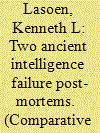

|
|
|
|
|
| Summary/Abstract |
This article looks at two ancient intelligence postmortems, one pertaining to intelligence failure in the Second Anglo-Dutch War in 1666, the other from Napoleon's invasion of Egypt in 1798. Both documents deal with wartime naval intelligence, and allow to put the practice of intelligence failure into historical perspective, study the nature of intelligence in these times, and to see that not only were the difficulties of intelligence analysis similar to those encountered today, but that the investigation of what went wrong also bears some resemblance to present-day official inquests.
|
|
|
|
|
|
|
|
|
|
|
|
|
|
|
|
| 6 |
ID:
168386
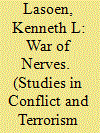

|
|
|
|
|
| Summary/Abstract |
The terror threat emanating from Daesh-inspired violent radicalization has made the vulnerability of soft targets and the means to defend them a pressing security challenge. Belgium responded to the threat by deploying the army to help protect the public space against terrorist attacks. This article explores the Belgian case of a counterterrorism mission by the military on home soil, but also looks at the wider security challenges posed by an asymmetric threat to the most vulnerable aspects of daily life, exploiting the openness and mobility of society. The study will also examine alternative ways to employ the necessary military skills and expertise to counter the threat to soft targets, from a re-examination of deterrence theory and by the utility of force, and introducing the concept of “marketing for counterterrorism” as a corollary to cognitive defense. It concludes with what tactical opportunities and policy prescriptions are presented for homeland security.
|
|
|
|
|
|
|
|
|
|
|
|
|
|
|
|